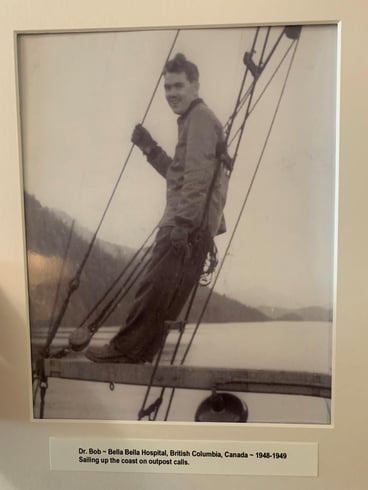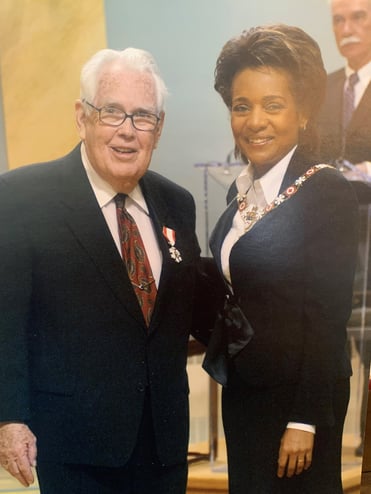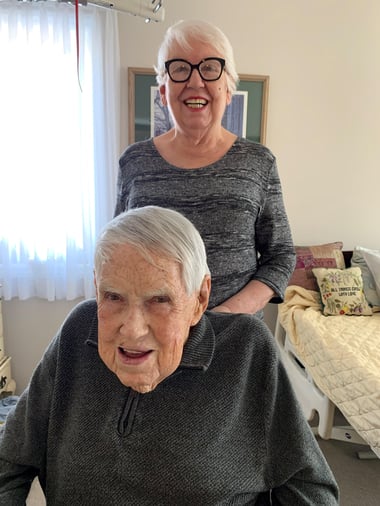In Canadian medical history, few individuals have had such a meaningful and influential life as Dr. Robert O'Dowda Stephens or “Dr Bob” as he is more affectionately known. Born on March 18, 1924, in Toronto, Dr. Stephens’ subsequent studies, achievements, and existence transformed the lives of countless individuals across the globe.
Studies and qualifications
After graduating from the University of Toronto in 1947 and completing his internship at Toronto Western Hospital, Dr. Stephens' passion for medicine and service took him from the remote First Nations reservation in Bella Bella, BC, to the halls of the Prince Leopold Institute in Antwerp, Belgium. It was here he received his diploma in Tropical Medicine and Hygiene, a qualification that would set the stage for his remarkable contributions to global health. Missionary work in Africa
Missionary work in Africa
Dr. Stephens' early medical work took place in what was then known as the Belgian Congo (Democratic Republic of Congo), where he founded a 100-bed hospital and established nursing and midwifery schools, along with satellite clinics. “I was always interested in working overseas. Partly because my grandad was a missionary in China in the 1800s. So I wanted to do that kind of work, to follow my religious beliefs and make the world better,” he said. Despite being forced to leave the country due to political turmoil and violent civil unrest after a ten-year stint, his foundational work there blossomed into a major referral center, a beacon of hope and healing. Sadly a lot of Bob’s friends were massacred during the Congo’s civil war as the country aimed to claim its independence from Belgian rule.
Specializing in tropical medicine back in Toronto
Returning to Canada in the 1960s, Dr. Stephens’ commitment to care and community continued unabated. He played a pivotal role in establishing North York General Hospital in Toronto, where he also served as President of the Medical Staff. His expertise in tropical diseases led him to develop a specialized clinic, the International Medical Service, which caters to travelers and immigrants from developing countries.
“I had a degree in tropical medicine so I set up a clinic in 1971 and it still stands today near North York Regional Hospital,” said Dr. Bob. The clinic provides people with vaccinations for travel but it also prepares people for cultural changes and helps individuals with depression who have come from war-torn areas so “it was more than just giving people needles” Dr. Stephens added.
Helping those less fortunate abroad
Beyond his practice, Dr. Stephens' leadership within the Evangelical Medical Aid Society as director and the Christian Medical and Dental Society of Canada saw him making frequent trips abroad. He travelled to China, Africa, the West Indies, and Eastern Europe, expanding access to medical care and education. During his 20-year stint with EMAS, his work - especially in remote northwest China, Cuba, and across Africa - earned him international recognition, including an honorary title from the Chinese government and an honorary Health Administration diploma from Uganda.
On top of this, when doctors go abroad to help and educate countries with struggling healthcare systems, Bob - working with Health Partners International Canada - standardized the kit that doctors would take with them.  Order of Canada, love, loss and retirement living
Order of Canada, love, loss and retirement living
In 2006 Dr. Stephens' dedication to service was acknowledged with the Order of Canada, the nation's most prestigious civilian award, celebrating his lifetime of outstanding humanitarian service. His efforts brought great honour to Canada, as recognized in a special acknowledgment by the Canadian House of Commons.
After retiring, Dr. Stephens' life continued to be marked by love, adventure, service and sadly some heartache. Following the loss of his wife, Ruth, to cancer, Dr. Stephens later found love and married Sylver, with whom he traveled extensively. They eventually settled at Aspira Island Park in Campbellford, Ontario, where Dr. Stephens celebrated his 100th birthday in style. PSWs play a large role in his life at Island Park, helping him with day-to-day tasks but he still manages to socialize a lot with his fellow residents. “He knows half the people here at least,” his wife Sylver said with a smile.
His secret to a long life and why he likes retirement living
When asked about his secret to a long life Bob said “Firstly there is your genes. You can’t change those. My mother lived until she was 96. Secondly, you have to take care of your mind, body and spirit. I kept moving, I never smoked and I never got drunk. With the mind it’s important to keep learning and thinking and I nourished my spirit with religion but there are other ways to nourish your spirit too.”
 Bob said the last ten years of his life have been the hardest. He’s had multiple health problems and although his mind is still strong, his body is getting weaker. But he still maintains a positive outlook and often tells his wife Sylver (pictured left) that he is “in great shape for the shape that he is in.” He wholeheartedly recommends life at Aspira because of the amazing staff. “The staff are great. It’s a good place to live.”
Bob said the last ten years of his life have been the hardest. He’s had multiple health problems and although his mind is still strong, his body is getting weaker. But he still maintains a positive outlook and often tells his wife Sylver (pictured left) that he is “in great shape for the shape that he is in.” He wholeheartedly recommends life at Aspira because of the amazing staff. “The staff are great. It’s a good place to live.”
Dr. Robert Stephens' journey through life is one of intense compassion and commitment. From the remote corners of the Belgian Congo to the bustling streets of Toronto, his legacy is a vivid portrait of a life well-lived, dedicated to the service of humanity. Dr. Stephens remains a cherished member of the Island Park community and his story is a source of inspiration for all who have the privilege of knowing him.


